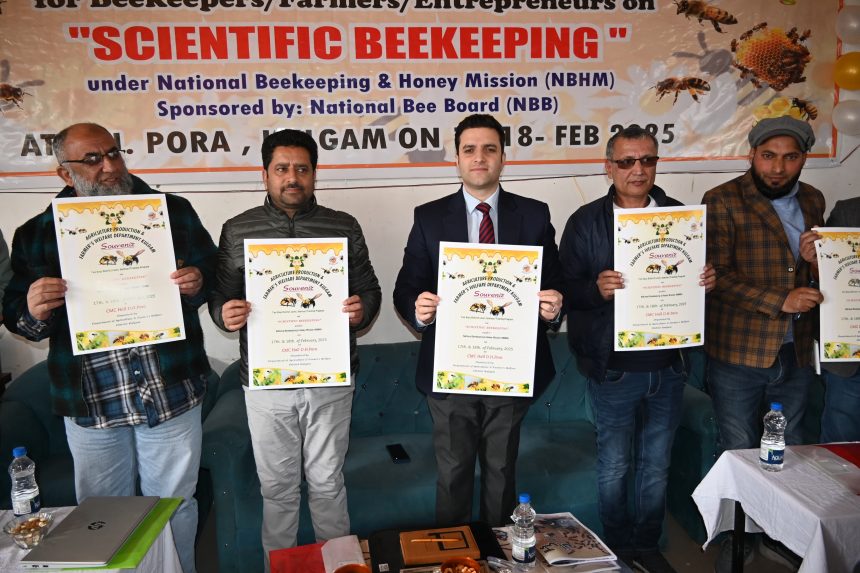As many as 41 beekeeping units have been established in Kulgam in a year and half under the Holistic Agriculture Development Programme (HADP), with increasing interest from individuals in beekeeping, officials said Monday.
District Agriculture Officer (DAO) Malik Reyaz Ahmed, said that beekeeping has attracted many people in Kulgam due to its potential as a sustainable livelihood. “In the past one year, 41 such units have been set up, providing direct employment to 41 individuals. Each unit can further generate livelihood opportunities for at least two more people.
He said that a single beekeeping unit consists of 35 bee colonies, and many people, particularly in the Devsar area, are engaged in the practice, earning a stable income. “Under both HADP and the National Beekeeping and Honey Mission (NBHM), approximately 76 units are operational in Kulgam, producing a significant amount of honey,” he added. On Monday, the Agriculture Department organised a programme on scientific beekeeping in Damhal-Hanjipora Kulgam, attended by numerous farmers. Deputy Commissioner (DC) Kulgam, Athar Aamir Khan, also interacted with the participants.
Speaking to reporters, DC Kulgam said that the Agriculture and Farmers Welfare Department of the district had conducted a seminar and workshop on scientific beekeeping. “Under the Holistic Agriculture Development Programme and the National Beekeeping and Honey Mission, the government is actively promoting beekeeping due to its vast potential,” he said. “In the past year, around 40-45 beekeeping units have been established, with new bee colonies and rearing activities. On average, under HADP, 30-35 bee colonies are set up per unit. If properly maintained, each box can yield around 20-25 kg of honey per year. The government provides an 80 percent subsidy under HADP,” he added. DC Kulgam further said that all necessary inputs, including bee boxes, equipment, training, and bees, are provided. Besides, under the National Beekeeping and Honey Mission, a 40 percent subsidy is available for farmers.
“This seminar was organized to encourage farmers and young people to take up beekeeping. Experts and successful beekeepers shared their experiences, providing valuable insights on scientific beekeeping practices,” he said.
He said that a well-established beekeeping chain exists in the district. “Some varieties require relocation in winter. Currently, Kulgam’s beekeeping units have been moved to Rajasthan for winter rearing. The Agriculture department also assists with transportation costs,” he said. “Given the enormous potential in this sector, we urge farmers and youth to connect with extension officers and field-level officers to establish beekeeping units and create sustainable employment opportunities.”

